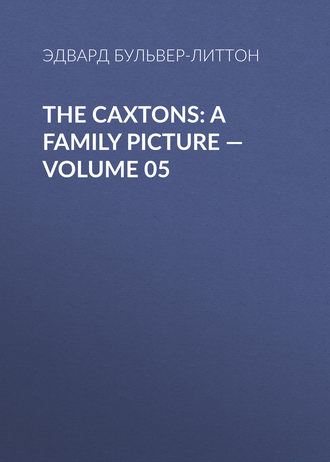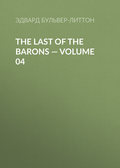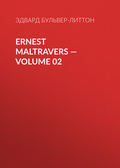
Эдвард Бульвер-Литтон
The Caxtons: A Family Picture — Volume 05
PART V
CHAPTER I
In setting off the next morning, the Boots, whose heart I had won by an extra sixpence for calling me betimes, good-naturedly informed me that I might save a mile of the journey, and have a very pleasant walk into the bargain, if I took the footpath through a gentleman's park, the lodge of which I should see about seven miles from the town.
"And the grounds are showed too," said the Boots, "if so be you has a mind to stay and see 'em. But don't you go to the gardener,—he'll want half a crown; there's an old 'Oman at the lodge who will show you all that's worth seeing—the walks and the big cascade—for a tizzy. You may make use of my name," he added proudly,—"Bob, boots at the 'Lion.' She be a haunt o' mine, and she minds them that come from me perticklerly."
Not doubting that the purest philanthropy actuated these counsels, I thanked my shock-headed friend, and asked carelessly to whom the park belonged.
"To Muster Trevanion, the great parliament man," answered the Boots.
"You has heard o' him, I guess, sir?"
I shook my head, surprised every hour more and more to find how very little there was in it.
"They takes in the 'Moderate Man's Journal' at the 'Lamb:' and they say in the tap there that he's one of the cleverest chaps in the House o' Commons," continued the Boots, in a confidential whisper. "But we takes in the 'People's Thunderbolt' at the 'Lion,' and we knows better this Muster Trevanion: he is but a trimmer,—milk and water,—no horator,— not the right sort; you understand?" Perfectly satisfied that I understood nothing about it, I smiled, and said, "Oh, yes!" and slipping on my knapsack, commenced my adventures, the Boots bawling after me, "Mind, sir, you tells haunt I sent you!"
The town was only languidly putting forth symptoms of returning life as I strode through the streets; a pale, sickly, unwholesome look on the face of the slothful Phoebus had succeeded the feverish hectic of the past night; the artisans whom I met glided by me haggard and dejected; a few early shops were alone open; one or two drunken men, emerging from the lanes, sallied homeward with broken pipes in their mouths; bills, with large capitals, calling attention to "Best family teas at 4s. a pound;" "The arrival of Mr. Sloinan's caravan of wild beasts;" and Dr. Do'em's "Paracelsian Pills of Immortality," stared out dull and uncheering from the walls of tenantless, dilapidated houses in that chill sunrise which favors no illusion. I was glad when I had left the town behind me, and saw the reapers in the corn-fields, and heard the chirp of the birds. I arrived at the lodge of which the Boots had spoken,—a pretty rustic building half-concealed by a belt of plantations, with two large iron gates for the owner's friends, and a small turn-stile for the public, who, by some strange neglect on his part, or sad want of interest with the neighboring magistrates, had still preserved a right to cross the rich man's domains and look on his grandeur, limited to compliance with a reasonable request, mildly stated on the notice-board, "to keep to the paths." As it was not yet eight o'clock, I had plenty of time before me to see the grounds; and profiting by the economical hint of the Boots, I entered the lodge and inquired for the old lady who was haunt to Mr. Bob. A young woman, who was busied in preparing breakfast, nodded with great civility to this request, and hastening to a bundle of clothes which I then perceived in the corner, she cried, "Grandmother, here's a gentleman to see the cascade."
The bundle of clothes then turned round and exhibited a human countenance, which lighted up with great intelligence as the granddaughter, turning to me, said with simplicity. "She's old, honest cretur, but she still likes to earn a sixpence, sir;" and taking a crutch-staff in her hand, while her granddaughter put a neat bonnet on her head, this industrious gentlewoman sallied out at a pace which surprised me.
I attempted to enter into conversation with my guide; but she did not seem much inclined to be sociable, and the beauty of the glades and groves which now spread before my eyes reconciled me to silence.
I have seen many fine places since then, but I do not remember to have seen a landscape more beautiful in its peculiar English character than that which I now gazed on. It had none of the feudal characteristics of ancient parks, with giant oaks, fantastic pollards, glens covered with fern, and deer grouped upon the slopes; on the contrary, in spite of some fine trees, chiefly beech, the impression conveyed was, that it was a new place,—a made place. You might see ridges on the lawns which showed where hedges had been removed; the pastures were parcelled out in divisions by new wire fences; young plantations, planned with exquisite taste, but without the venerable formality of avenues and quin-cunxes, by which you know the parks that date from Elizabeth and James, diversified the rich extent of verdure; instead of deer, were short- horned cattle of the finest breed, sheep that would have won the prize at an agricultural show. Everywhere there was the evidence of improvement, energy, capital, but capital clearly not employed for the mere purpose of return. The ornamental was too conspicuously predominant amidst the lucrative not to say eloquently: "The owner is willing to make the most of his land, but not the most of his money."
But the old woman's eagerness to earn sixpence had impressed me unfavorably as to the character of the master. "Here," thought I, "are all the signs of riches; and yet this poor old woman, living on the very threshold of opulence, is in want of a sixpence."
These surmises, in the indulgence of which I piqued myself on my penetration, were strengthened into convictions by the few sentences which I succeeded at last in eliciting from the old woman.
"Mr. Trevanion must be a rich man?" said I. "Oh, ay, rich eno'!" grumbled my guide.
"And," said I, surveying the extent of shrubbery or dressed ground through which our way wound, now emerging into lawns and glades, now belted by rare garden-trees, now (as every inequality of the ground was turned to advantage in the landscape) sinking into the dell, now climbing up the slopes, and now confining the view to some object of graceful art or enchanting Nature,—"and," said I, "he must employ many hands here: plenty of work, eh?"
"Ay, ay! I don't say that he don't find work for those who want it. But it ain't the same place it wor in my day."
"You remember it in other hands, then?"
"Ay, ay! When the Hogtons had it, honest folk! My good man was the gardener,—none of those set-Lip fine gentlemen who can't put hand to a spade."
Poor faithful old woman!
I began to hate the unknown proprietor. Here clearly was some mushroom usurper who had bought out the old simple, hospitable family, neglected its ancient servants, left them to earn tizzies by showing waterfalls, and insulted their eyes by his selfish wealth.
"There's the water all spilt,—it warn't so in my day," said the guide.
A rivulet, whose murmur I had long heard, now stole suddenly into view, and gave to the scene the crowning charm. As, relapsing into silence, we tracked its sylvan course, under dripping chestnuts and shady limes, the house itself emerged on the opposite side,—a modern building of white stone, with the noblest Corinthian portico I ever saw in this country.
"A fine house indeed," said I. "Is Mr. Trevanion here much?"
"Ay, ay! I don't mean to say that he goes away altogether, but it ain't as it wor in my day, when the Hogtons lived here all the year round in their warm house,—not that one."
Good old woman, and these poor banished Hogtons, thought I,—hateful parvenu! I was pleased when a curve in the shrubberies shut out the house from view, though in reality bringing us nearer to it. And the boasted cascade, whose roar I had heard for some moments, came in sight.
Amidst the Alps, such a waterfall would have been insignificant, but contrasting ground highly dressed, with no other bold features, its effect was striking, and even grand. The banks were here narrowed and compressed; rocks, partly natural, partly no doubt artificial, gave a rough aspect to the margin; and the cascade fell from a considerable height into rapid waters, which my guide mumbled out were "mortal deep."
"There wor a madman leapt over where you be standing," said the old woman, "two years ago last June."
"A madman! why," said I, observing, with an eye practised in the gymnasium of the Hellenic Institute, the narrow space of the banks over the gulf,—"why, my good lady, it need not be a madman to perform that leap."
And so saying, with one of those sudden impulses which it would be wrong to ascribe to the noble quality of courage, I drew back a few steps, and cleared the abyss. But when from the other side I looked back at what I had done, and saw that failure had been death, a sickness came over me, and I felt as if I would not have releapt the gulf to become lord of the domain.
"And how am I to get back?" said I, in a forlorn voice to the old woman, who stood staring at me on the other side. "Ah! I see there is a bridge below."
"But you can't go over the bridge, there's a gate on it; master keeps the key himself. You are in the private grounds now. Dear, dear! the squire would be so angry if he knew. You must go back; and they'll see you from the house! Dear me! dear, dear! What shall I do? Can't you leap back again?"
Moved by these piteous exclamations, and not wishing to subject the poor old lady to the wrath of a master evidently an unfeeling tyrant, I resolved to pluck up courage and releap the dangerous abyss.







